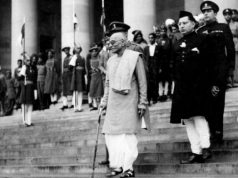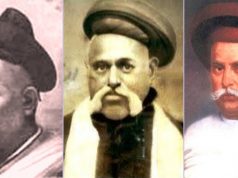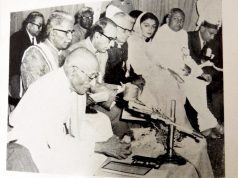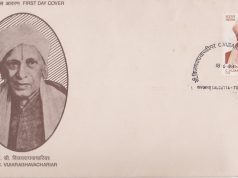This piece was first published in the December 15, 1960 issue of ‘The Indian Libertarian’. In this piece, Venkata Rao examines the leftist tendencies that had come to dominate the political discourse in many countries—significantly impinging on individual freedom. India, of course, significantly constrained the economic liberty of the people, with the state having a monopoly over many industries and over-regulating the ones it left to private initiative. In this piece, he remarks of the dangers of state excesses in the economic life of people, and what he believed was the proper role of the state in society. The present piece is a slightly abridged and edited version of the article as it first appeared in 1960.
The present era, especially since the 1917 October Revolution in the USSR, has come to be dominated by Leftist ideas. The central characteristic of Leftism of all varieties today is an unquestioning belief in the omnicompetence of Government. Socialists hold that Government is the general agency of society for doing good in every sphere of social life–education, religion (by regulation or disparagement), economic life, constitutional matters, philosophical ideas, moral notions, sports and what not.
This is a trend that naturally and inevitably results in communism in society and state. When Senator MacCarthy was harassing officials in the USA with his charges and suspicions of pro-communist activities, Mr Chodorov, a leading libertarian thinker told him that there was no need to make charges against particular officials. All of officialdom anywhere, given their head, will bring about communism unwittingly by making government power omnicompetent and all-pervasive, leaving no field of life, neither art nor culture, neither religion nor morality! It is the nature of bureaucracy to aggrandize itself to the limit and usurp the sovereignty of the people and destroy democracy as such.
The influence of Leftism in the world is so over-mastering that even educated people are unable to think of an alternative to socialist theories and programmes. They seem so natural and normal that any suggestion going contrary to them are rejected out of hand as reactionary and pro-capitalist. Motives are attributed to critics as being influenced by capitalist bribery! All thinking, according to Marxism on social matters, (even on scientific matters), is motivated directly or indirectly by the economic motive of class interest. There is no possibility of objective thinking according to orthodox Marxism, thinking inspired by reality as it is and verifiable by independent persons anywhere. That is why we find that Soviet Russia controls even the substance of scientific thinking, the ultimate ideas supposed to the discovery of scientists. Lisenko is an example who tried to sustain official doctrine (in despite of scientific evidence) in obedience to official dictat. Even novelists and poets are subjected to dictation as to how they should deal with their subject matter! The aim in Partism in every intellectual activity–including even history which is re-written to suit the changing ideology of the men in power!
This way lie the stagnation and death of culture and civilization.
Even in the United States which retains such a large measure of free world ideals, thoughtful observers are noting the ever lengthening shadow of Government.
The Rev. Ermund A Opitz, a writer in the Foundation for Economic Education of Irvington-on-Hudson, New York, has dealt with this topic in a leaflet of that name. He points out that the government of the United States has been steadily encroaching on private life for years now. He instances the fact that in 1947 the federal government contributed as much as half the entire budget of all university expenses. And if lower levels of education were included, the percentage of government expenses would extend to 90%!
Mr. Chodorov and Mr. Read and others have shown how nearly a third of the income of the people is annexed by governments at various levels and how a tenth of all employees in the nation belong to government service.
Under the name of welfare, federal expenditures are constantly increasing, even Republican Party presidents like Eisenhower having to spend federal money on welfare like old age pensions and to retain the vast price floors to support agriculture and enrich farmers at the expense of the country! The sums involved are astronomical and free competition has been excluded effectively since before the war in this field ever since the Agricultural Adjustment Administrative Act of the New Deal President Roosevelt. And democracy, anxious to cater to voters has failed to return to private enterprise and risk-taking in farming, in spite of the national philosophy of free, private enterprise to which all classes of Americans except communists pay tribute in conversation and writing.
How far the trend has gone in coloring the thought of educated persons in our country as well, thanks largely to the example of Prime Minister Nehru, was brought vividly home to me in a recent conversation with two persons–one a high railway official and the other a professor from Patna, just returned from a doctorate training in the USA in economics and labour welfare. Both repudiated the wisdom of returning public enterprises started by government (on account of the unpreparedness of private industrialists to start certain lines of industry on their own) I point out that the pre-independence administration of Mysore under able Dewans like Dr. M. V. Visweswaria and Shri Mirza Ismail had inaugurated the practice of returning successful government concerns to private shareholders and joint stock companies. This policy releases public funds for re-investment in new concerns of a pioneering nature. It also educates citizens in economic responsibility, integrity and the management skills needed for success in industry. Such educative influence is part of the idea of statesmanship in the old days before Leftism overwhelmed all public policy and private thinking.
The two gentleman referred to above reacted strongly and refused to concede the wisdom of the policy proposed. They thought that it was necessary for government to retain economic power to prevent concentration of power in the hands of tycoons! They forgot that their view involved a concentration of both economic and political or police power in the hands of the same governing groups! This is worse in every way!
The Lengthening Shadow of Government
Birlas and Tatas cannot imprison citizens and harm to the extreme extent that government can! Those who offend the governing groups will have to pay dearly for their temerity and independence of mind in one way or other.
It is to be hoped that statistics will study and show to what extend government power has penetrated beyond healthy limits in India. What is the percentage of national income annexed by government by way of taxes? What is the extent of the proliferation of the bureaucracy? It is said that from an expenditure of Rs.35 crores on the Secretariat in 1947, we have today the astronomical figure of Rs. 250 crores on Central Government staff!
Committees and delegations are becoming innumerable and incessant. Every day we hear of new bodies of the bureaucracy being formed at the public expense.
The control of Government even over spheres not taken directly under official auspices and management is also extending. Indeed Government intervention in private industry and commerce is so all-pervasive that even the government has been constrained to appoint a committee to estimate how much of all this is necessary and how much supererogatory! The number of forms to be filled up and the number of offices to be negotiated with by businessmen has grown to fantastic proportion. A World Bank official was constrained to advise the Government of India that this ubiquitous and vexatious control of enterprise and management should be decreased in order to give the much-needed elbow-room to them in the interests of efficiency. Economic freedom seems to be a term absent altogether in the vocabulary of officialdom!
After the nationalization of the Imperial Bank and Life Insurance, Government are reported to be anxious to annex fire and general insurance as well. They are reported–as they are advised by fellow travelling ‘economists’–to be preparing to nationalize all banking!
Though they have left private sector in other fields like textiles, sugar, cement and steel theoretically free, these are controlled to such an extent that they are hamstrung and for all practical purposes they are as bad as government-owned industries. Their prices are controlled and their every activity is under the regulation of the government.
There is a great danger in such omnivorous state control of industries. It gives room for corrupt practices by the ruling party. It appears (it is learnt from a sugar cane expert and retired director of agriculture) that by raising the export price of sugar by one anna per maund, the sale proceeds rose to 21 crores of rupees! It is anybody’s guess as to how much of this windfall was contributed to party funds! The ruling party can thus use the price-fixing machinery and power to enhance its funds.
To prevent this, earnest democrats have been urging the party and government to rescind the legal permission given to companies to contribute to party funds. Such a practice does not exist anywhere and is explicitly prohibited in the United States of America.
A strong and insuperable objection to such unlimited exercise of power by the Government, particularly in economic affairs, is that the practice extends the sphere of violence operating on the citizen in society.
Violence impinging on human beings is inherently evil. As Mr. (Leonard) Read demonstrates elaborately in his Government–An Ideal Concept, every individual is endowed by nature with a certain quantum of energy which flows spontaneously only at the impulse of his own personal will and desire. Any threat or application of force thwarting him from doing what he wishes is something that prevent the free self-expression of his energy motivated by his own aims. It is only self-determined activities that bring joy and fulfilment to human selves.
Deprecating such misuse of State power even by democrats, libertarians advise that the State should be relegated to its proper and specific function of maintaining law and order and securing the defense of the country from invasion. It should have functions and powers strictly limited to such securing of justice. The rest of the individual’s life should be completely free to be led as he thinks best. Even welfare should not be made an excuse for State interference. This doctrine of Limited Government needs to be studied and popularized in India at the present grace juncture. The task needs much penetrating thinking from many points of view. Libertarian literature, American and Indian and British, will be of much benefit to thinkers and party leaders in opposition.
You can read the original, unabridged piece here. Visit indianliberals.in for more works by Indian Liberals dating back to the 19th Century.
Post Disclaimer
The opinions expressed in this essay are those of the authors. They do not purport to reflect the opinions or views of CCS.





